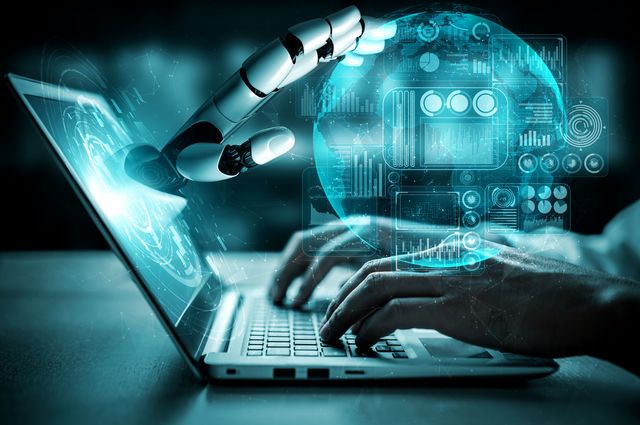Can ChatGPT Replace Human-Created Hotel Marketing Content?
12 experts shared their view
Any marketing content that describes your product - in this case your hotel - must be original, authentic, enticing and believable. Your marketing content should tell a consistent "story" about your hotel's value proposition and brand, and inspire travelers to consider and eventually book your property. This is marketing 101. This rule applies to your website copy and descriptions, OTA and directory listings, social media posts, digital marketing messaging, etc. If it is not, then you are hurting yourself by alienating your prospective guests and sending them to the competition.
Today we are dealing with digitally-savvy, experienced travelers. The prevailing thinking is: If the hotel hasn't invested in describing well their property, services and amenities so that I feel intrigued and engaged, just imagine what state the property itself is in!
In the same time, creating this original, authentic, enticing and believable marketing content is expensive. You need professional storytellers - copywriters who are expensive to employ or hire - to tell the hotel story.
The question is, can hoteliers replace human content creators with generative AI-created marketing content, using AI chatbots like ChatGPT or Google Gemini?
Yes and no.
A good comparison to rationalize how GPTs will be used by hotel marketers is to look back at the advent of front-end CMSs and visual composers for websites. Not only did these greatly reduce the costs of website development and updates, but now marketers could directly make simple edits on the fly, allowing them to test different copy / images. In each case, the marketer was observing how customers were responding to the presentation, then looking for +/- results. GPTs will work the same way, only it will be the computer doing the observing / readjusting, with humans regulated to oversight (strategic direction).
This is the 'yes' answer; AI will be used to optimize hotel marketing material. The 'no' comes in due to the content arms race that GPTs will bring about through its democratized (read: cheap) access. Going back to our historic example, once the first hotel websites installed a CMS, it wasn't long before the competition built their own and other marketers had access to the same quick-edit tools. So, there will be brands that are the early adopters of content GPTs, but then the floodgates will open and the field will eventually level back out.
Tools like ChatGPT or Google Gemini are phenomenal copywriters and should be used as enablers, tools to make our work easier, quicker, and more creative. Thus, it's not a matter of hoteliers "replacing" content creators with generative AI tools but rather making the most of them to become more productive and efficient.
I have seen many hoteliers, restaurants and DMO use these tools to rework existing pages, create new social media posts or gather ideas for original newsletters or blog posts. Not to mention the possibility to analyze sentiment in online reviews and even generate original responses to comments left on Google Reviews, Expedia or Booking.
Hoteliers can sometines get caught in a rut or even copy-paste answers in their customer emails or responses to online reviews, so this is another area where genAI can prove useful. Again, not replacing humans or content creators, but rather enabling them to do work more creatively and efficiently.
Yes, these tools can provide a significant degree of heavy lifting.
With a little more training and relevant targeted content these tools can also pick up on levels of nuance and style.
Although care should be taken to ensure that the produced information is not in some ways plagiarized from the existing reference pool of content.
Short answer: Yes.Long answer: Faced with the threat of human obsolescence in the creative sector, I believe the considerations I have previously expressed regarding the future of hospitality also apply to content creation. In an article titled "The Hotels of the Future: Anthropocentric, Technocentric, and Hybrid," I discussed the possibility that, in the near future, three types of hotels might coexist, differentiated not by stars or reputation but by the percentage of biological staff employed. This perspective offers an intriguing parallel with the content creation sector, where I believe two likely scenarios will emerge: on one hand, content produced entirely by humans could become a luxury ("Human-as-Luxury"), sought after for its authenticity and intrinsic value, similarly to the contemporary appreciation for traditional craftsmanship. On the other hand, the figure of the content "creator-as-director" emerges, who utilizes artificial intelligence models to execute content, thereby redesigning the human role from creator to project manager. This discussion is more easily understandable, I believe, by looking at the world of art (which is the purest and least vile form of content creation)...
Related article by Simone Puorto
Any marketing content that describes your product — in this case your hotel — should be original, authentic, enticing, and believable. Marketing content needs to tell a consistent "story" about your hotel's value proposition and brand, and inspire travelers to consider and eventually book your property vs. your competition — this is marketing 101. If messaging isn't authentic and consistent, you will alienate your prospective guests and end up sending them to the competition.
Today we are dealing with digitally-savvy, experienced travelers. The prevailing thinking is: If the hotel hasn't invested in describing their property, services, and amenities well so that I feel intrigued and engaged, just imagine what state the property itself is in!
At the same time, creating this original, authentic, enticing, and believable content is expensive. You need professional storytellers — copywriters who are expensive to employ or hire — to tell the hotel story. Right now, AI won't completely cut it. But soon, it could!
The question currently isn't
will ChatGPT replace existing marketing efforts?butcan hoteliers augment their existing, human-powered marketing efforts?I think yes.
Based on the potential of ChatGPT, Google Gemini and Sora for video, yes - hoteliers could replace human content creators. But to ensure quality and relevance, they'd still require someone to act as a gatekeeper, particularly as the technology continues to be refined.
The key to productive AI is the data you feed it. The brief you provide, the parameters you set, and how you refine your instructions will determine the quality of the output.
Feed an AI program with guest reviews and feedback, property and local area information, plus clear brand guidelines and tone of voice instructions, and you'll get speedy results a creative copywriter would need to spend days researching.
Imagine describing your hotel through all the positive attributes commended by your guests, drawing on the nuances of what guests think makes your property great. That's where this tech has the edge over human creators. However, there'll still be the need to tweak the text - and you've got to understand how to produce good content to be able to construct a solid brief, so it's not the death of creative humans just yet.
At EOS Hospitality we encourage using generative AI for content creation and emphasize to our marketing teams that AI is not there to "steal your job" but can help create content quickly and at scale.
We use AI for content creation across multiple marketing channels (website, email, social, print) but it still requires human review and approval. Humans will remain pivotal because AI can't possibly take all the situational factors, historical performance, competitive landscape and institutional knowledge of a hotel into account when creating and distributing marketing content. It does shorten the timeline to produce good content, which is a major reason why we use it. One of the best examples is email subject line testing where AI can produce 3-5 subject lines that meet best practices, perform well and are a perfect basis for A/B testing.
Let's also remember that the industry continues to face a labor shortage and pressure on marketing budgets in the uncertain economic climate post-covid. So any technology that lightens the work load should be embraced as it frees marketing talent to concentrate on areas that have the biggest impact on hotel performance such as brand development, marketing planning and delivering great guest experiences.
Hotel marketers absolutely must use generative AI as part of their content development process. Doing otherwise today would be like trying to run your hotel without a property management system: it can probably be done; but it's a terrible idea. Can you imagine OTAs or the very best marketers not using every available benefit to improve guest experience? Of course not.
At the same time, this isn't about replacing people with technology. It's about using tools to help your team create helpful, effective content easily and inexpensively. How your team uses those tools must be informed by strategy. And that strategy must include appropriate governance to ensure that the information produced by genAI meets well-defined standards for accuracy and adherence to your brand's values. In other words, you must put the people and processes in place to make sure genAI works for your guests and your business.
This isn't hard. It's also not terribly time consuming. "Easy and fast" are among the benefits AI provides. The time to ask the question about whether to use generative AI is already past us. The questions now are how to do it well within your organization — and how soon you can get started.
I expect AI will eventually replace human-created hotel marketing content in just a few years. Yet, will it be the next two or three generations of ChatGPT or even a more revolutionary AI tool other than ChatGPT? That is another question.
It is true that customers value and appreciate customized content tailored to their specific interests. Still, a reliable human content manager needs months or years to learn/understand a brand's "story" and identity. Why can't AI "understand" a hotel brand's "story" and identity through deep learning?
Don't forget that learning is in AI's DNA. AI can also become a professional storyteller through "learning," but at a much faster pace than humans. Before AI is "mature" enough to do everything independently (like now), hotels must train managers to use generative AI as their "personal assistants," helping them create marketing content. When AI is "mature" enough (in the future), hotels can train AI to create authentic content that speaks for a brand.
Effective use of Generative AI undeniably expedites tasks, automating and amplifying the reach of marketing. GenAI excels at content creation and can aid hoteliers in crafting marketing content and structure. It can easily provide updated information to position a particular hotel in a particular city with suggestions of nearby attractions and places to visit. This generative content can be captured and catalogued neatly, considering style, and even translated into multiple languages.
However human intelligence is required to give the appropriate requests, specific instructions, and contextual directions. AI needs to be guided with elements such as brand tone, target audience needs and cultural sensitivity.
Although AI is unlikely to replace humans entirely, those who fail to strike the right balance between AI and human intelligence risk falling behind. The optimal approach involves integrating AI's efficiency with human creativity and intuition, thereby ensuring that marketing content captivates audiences while maximising productivity.
100%. It will eliminate 90% of the job so less people can help more client, net effect, jobs lost. Here is why:
A) Human Content Creators USE AGI to create their content, then give it a fine tune. So they can take on more clients.
B) Hotels do not require a full time resource anymore but have a much larger talent accessibility now as they can find contractors to work on a needed basis. The can now Hire "A"
C) Hotels who never had a marketing department can now do most themselves and be the "fine tuner" at the end
Similar to the laptop, Microsoft 365, Adobe or Canvas, genAI like ChatGPT and Google Gemini is becoming an important tool for hotel marketers and marketing creators. A tool nonetheless.
Today, the main issue with genAI-generated marketing content is that a) it requires well-thought out prompts - there is even a new profession called "prompt engineering!", and b) emotional editing and proofreading to add a human-touch to the content.
Without the above, genAI comes up with regurgitated, off-the-shelf copy, with no human emotions involved and not understanding sentiment, no personalization for the various key customer segments (corporate, leisure, group, social events, etc.), no sense as to how hoteliers are positioning their property vs the competition, how guests are perceiving on an emotional level the property and its product.
We are many years before genAI can begin mimicking human emotions, and yet even then there will be a need for humans to come up with the correct prompts, what the marketing objectives are, provide the data, and do the final "emotional proofreading", etc.
So, don't be hasty in firing your digital marketing agency and PR, and replacing them with genAI.At least not yet. Not until genAI starts understanding human emotions and acquires personality.












